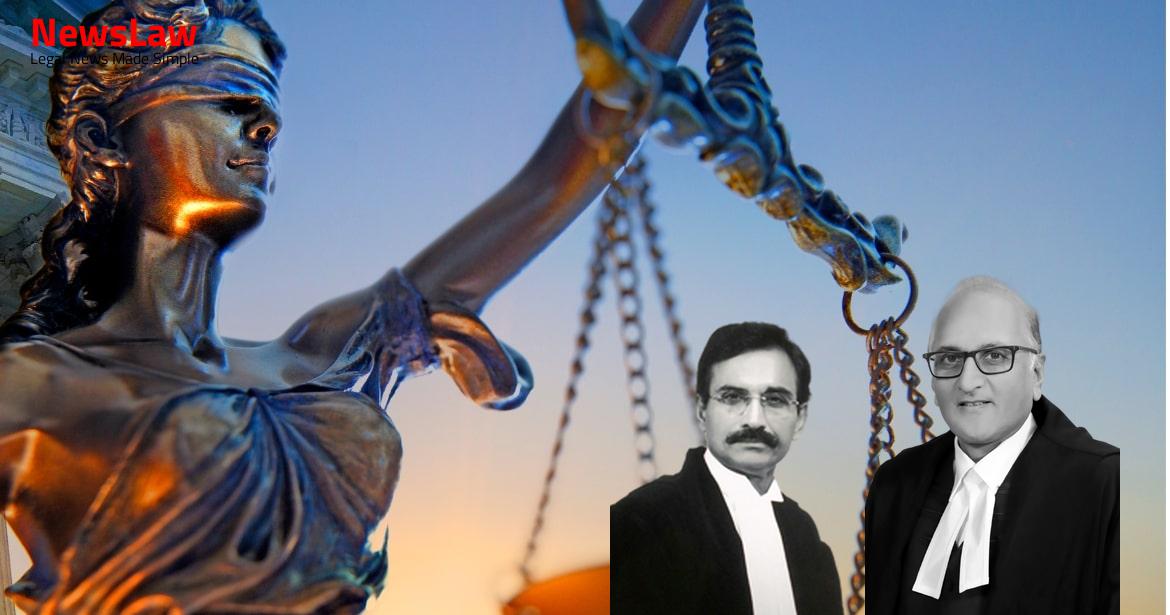Explore the court’s thorough examination regarding the interpretation of age limit provisions in educational appointments. The analysis delves into the significance of upholding eligibility criteria to ensure fair and transparent appointment processes. Follow along to understand the legal intricacies of age restrictions in public sector appointments.
Facts
- The Rehbar-e-Taleem (Re-T) scheme was introduced in Jammu and Kashmir to promote and decentralize elementary education with community participation.
- Respondent No. 2 was selected for appointment as Re-T and has been serving since May 17, 2003.
- The High Court directed the appointment of Respondent No. 1 and continuation of Respondent No. 2, which was challenged by the State of Jammu and Kashmir.
- The State’s main grievance was that the High Court’s decision was in error regarding the appointment of Respondent No. 1 and the continuing of Respondent No. 2.
- Respondent No. 2 filed for suitable directions as her remuneration had not been paid since May 2008.
- Village Level Committees were involved in the selection process for Re-T appointments as part of the SSA scheme, aimed at improving literacy by providing more teachers in areas with deficiencies.
- Re-T appointed initially for 2 years, extendable for 3 years
- Advertisement in ‘Aftab’ newspaper on 29.11.2002
- SRO 30 of 2003 cannot apply retroactively
- Respondent No 2 appointed as Re-T, challenged in High Court
- High Court upheld appointment based on age relaxation
- Division Bench ruled Respondent No 2 ineligible due to age
- Agreement with Division Bench decision
- Requirement for Re-T to fulfill qualifications set by State Government
- Provision for absorption of Re-T as General Line Teacher
- Appointment as Re-T based on Village Level Committee recommendation
- Upper age limit for Re-T appointment is 35 years as of 01.01.2002
- State of Jammu and Kashmir appeals Division Bench decision
- Division Bench directs appointment of Respondent No 1 as Re-T
- Focus on ensuring accountability and effectiveness in schooling system
Also Read: Legal Analysis on Seniority Fixation in Contempt Petitions
Arguments
- Single Judge interpreted ‘as far as possible’ as directory based on the Iridium Indian Tele-Communication case.
- Division Bench disagreed, stating that the Iridium Indian Tele-Communication case does not apply.
- The eligibility criteria in the advertisement specified that candidates should not be above 35 years of age.
Also Read: Analysis of Authorization and Limitation in Filing Section 7 Application
Analysis
- The Court in Iridium Indian Tele-Communication upheld the view of the Full Bench of the Calcutta High Court in Manickchand Durgaprasad regarding the interpretation of the words ‘as far as possible’ in clause 37 of the Letters Patent.
- It was established that the words ‘as far as possible’ in clause 37 are considered merely directory, not mandatory.
- The eligibility criteria for appointment as Re-T includes the condition that a candidate should ‘as far as possible’ meet the age qualification set by the State Government.
- The interpretation of clause 37 of Letters Patent in Iridium Indian Tele-Communication specifically dealt with the High Court being guided ‘as far as possible’ by provisions of the Code of Civil Procedure when making rules and orders.
- The Full Bench of the Calcutta High Court in Manickchand Durgaprasad clarified that rules framed under clause 37 would supersede corresponding provisions of the Code of Civil Procedure in case of any inconsistency.
- The High Court upheld the appointment of the 1st Respondent as Re-T due to constitutionality concerns.
- The provision regarding the upper age limit for Re-T appointment was deemed mandatory to avoid arbitrariness.
- Strict adherence to Articles 14 and 16 of the Indian Constitution is vital for public post appointments.
- Uniform eligibility criteria must be followed to prevent arbitrary selections.
- Interpreting the upper age limit provision as directory would give excessive power to the executive for age relaxations beyond 35 years.
- Even overaged Re-T teachers could be eligible for appointment through age relaxation.
- The advertisement in question was for a Re-T post, either Respondent No.1 or No.2 could have been appointed.
- The 2nd Respondent, aged over 35 on the cut-off date, was ineligible for appointment.
- Consequently, the Division Bench upheld the continuation of the 2nd Respondent.
- The absence of a specified minimum age limit raised concerns over potential discretion in selecting candidates over 45 years.
- A lack of uniformity in Re-T selection could result from interpreting the upper age limit provision loosely.
- The government’s authority to relax the upper age limit for Re-T regularization was noted.
- The conclusion drawn was that 35 years was the definitive upper age limit for Re-T appointments, and the scheme was discontinued to consider Re-Ts for absorption as General Line Teachers.
- The High Court’s directive to appoint both Respondent Nos. 1 and 2 was deemed inappropriate.
Also Read: Judicial Review of Selection Process for DGP Appointment
Decision
- The Appellant is directed to accommodate the employee in any other vacancy.
- The appeal is disposed of accordingly.
- Respondent No.2 has been working since 2004.
- The High Court’s direction to appoint Respondent No.1 is upheld.
- The directive to continue Respondent No.2 is set aside.
Case Title: THE STATE OF JAMMU AND KASHMIR Vs. SHAHEENA MASARAT (2021 INSC 573)
Case Number: C.A. No.-004991-004991 / 2012



